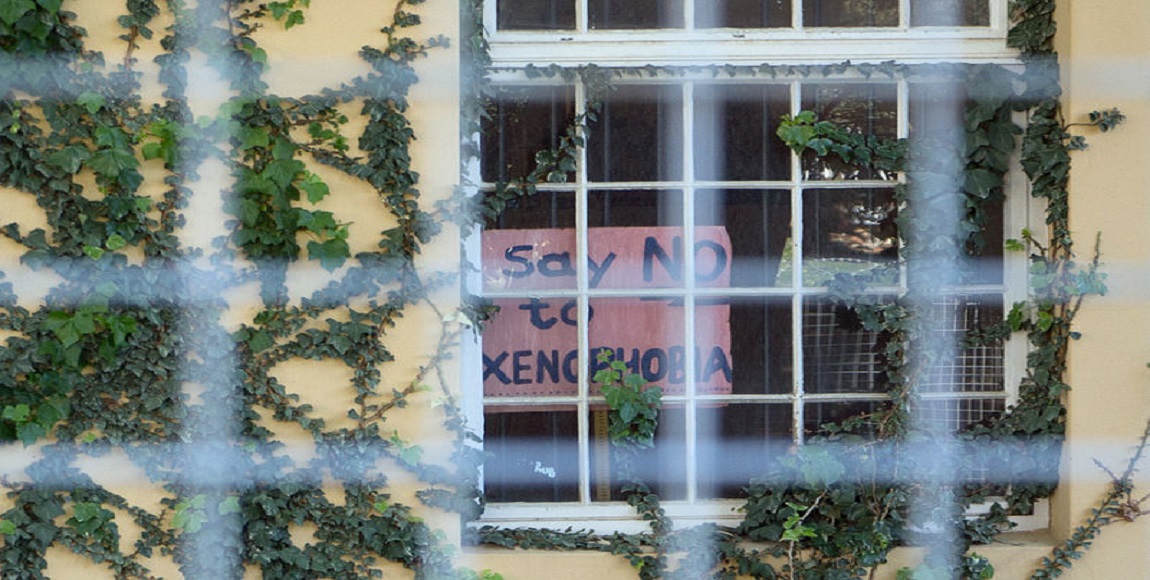South Africa has been gripped by xenophobic violence in the past years. For the past ten years or so, there have been repeated acts of extreme violence and xenophobia directed at Africans living in South Africa. It happens over large scales like in 2008 where thousands were internally displaced. However, it can also be on a smaller scale with everyday violence.
The recent violence began on Sunday night in Jeppestown. It was reportedly in reaction to the deaths of two people in a building fire. The protests soon spread to Malvern, the Johannesburg CBD, Tembisa, Katleong, and Alexandra. Stores were attacked, looted, and burnt. Reports say that seven people were killed in the violence.
Police minister Bheki Cele met with the crowd in Jeppestown on Monday. An imbizo to discuss a way to end the violence has been set up for Sunday September 8.
This huge problem of xenophobia in South Africa has been compounded by the rhetoric spouted by politicians. Institutionally from government ministers to mayors and department officials, xenophobia permeates all sectors.
As Simon Allison writes in the M&G: “Not too long ago, South Africa was beloved by the rest of Africa. Now we are reviled — and we have only ourselves to blame.”
The recent xenophobic violence has elicited a strong reaction from other African countries. Nigeria, Zambian, and Mozambican governments and people have responded strongly to attacks reported on immigrants.
Zambia
Students from Zambia marched to the South African high commission to deliver a protest about the xenophobic violence. The students also protested against South African-owned stores in the capital, Lusaka. Luckson Arthur Sika, a university teaching assistant from Zambia told The Daily Vox the student body organised the protest and there was a plan to storm a Pick n Pay and Shoprite.
“None of this really happened, the stores closed down before they could teach there. So most of them proceeded to the SA embassy (about 6km away). While there, no one addressed them at all…so they burnt down the posters and small billboards at the entrance,” said Sika.
He said most radio stations have stopped playing South Africans music. As for how the people in Zambia feel: “Some people feel like an eye for an eye will be the best course of action, while others are more pacifist saying that Zambia has more to lose if we lost our relations with SA.”
The Zambian football association cancelled a friendly against Bafana Bafana. The match was to be played in Lusaka on Saturday. South Africa’s football association confirmed that the Zambian association cancelled the match because of the violence “including targeting [of] their own people.”
The president of Zambia Edgar Lungu has also released a statement condemning the xenophobic attacks. Lungu called for the South African government and regional bodies to take action “before this xenophobia degenerates into full-scale genocide.”
There has been a huge jump in the amount of people in Zambia who are interested in what is happening. Most of the popular search topics include xenophobic attacks in South Africa, and Boko Haram.
The Boko Haram search topic is likely the result of an alleged video going around saying that Boko Haram are threatening South Africa over the violence. The authenticity of this video has not been verified. The Nigerian government however has responded to the violence.
Nigeria
The Nigerian government have boycotted the World Economic Forum (WEF) which is currently happening in Cape Town. The vice-president withdraw from attending the forum which he was due to speak at.
The South Africa high commission in Nigeria was summoned by the Nigerian foreign minister. The minister wanted “to protest the unacceptable burning and looting of properties belonging to Nigerians” and make “concrete proposals” for compensation of Nigerians affected. There are reports that the Nigerian ambassador to South Africa will be recalled.
Protests at the South African embassy in Nigeria led to it being temporarily closed said the Department of International Relations and Cooperation (Dirco). While no one was hurt during the protest, an embassy vehicle was damaged.
The Nigerian government has also sent a special envoy to discuss their concerns with the South African government.
Just like in Zambia, several South African owned businesses including Shoprite and MTN were targeted by the local people. Nigerian people took to protesting outside these businesses. Reports from CNN is that protestors set fire to many entrances at a mall which has a Shoprite.
Nigeria artists are also instituting a cultural boycott of South Africa. Singer Tiwa Savage announced she would be pulling out of festival she was due to perform in. Artist Burna Boy said he has not visited the country since 2017 after a “xenophobic” experience. He said: “And I will NOT EVER go to South Africa again for any reason until the SOUTH AFRICAN government wakes the fuck up and really performs A miracle because I don’t know how they can even possibly fix this.”
Other countries
There were also reports of other African leaders pulling out of the WEF. This includes the presidents of Rwanda, Malawi and the Democratic Republic of Congo. However, these government and WEF have all denied the xenophobic violence was the reason they didn’t attend.
An esports tournament scheduled for 7-8 September in Cape Town is being affected by the xenophobia. The Zimbabwean team supposed to compete have pulled out. “Unfortunately, we have had to shelve plans to send our team due to the current situation in that country,” the founder and director of E-Sport Zimbabwe, Thomas Arnold Phiri said, a Zimbabwean news site reported.
The Zimbabwean president President Emmerson Mnangagwa has called on the South African government to use force to stop the xenophobic attacks.









